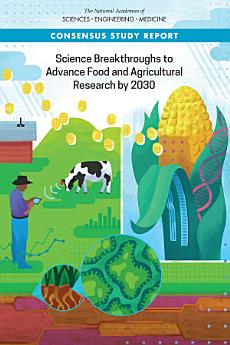Science Breakthroughs to Advance Food and Agricultural Research by 2030
About this ebook
More than a third of the food produced is unconsumed, an unacceptable loss of food and nutrients at a time of heightened global food demand. Increased food animal production to meet greater demand will generate more greenhouse gas emissions and excess animal waste. The U.S. food supply is generally secure, but is not immune to the costly and deadly shocks of continuing outbreaks of food-borne illness or to the constant threat of pests and pathogens to crops, livestock, and poultry. U.S. farmers and producers are at the front lines and will need more tools to manage the pressures they face.
Science Breakthroughs to Advance Food and Agricultural Research by 2030 identifies innovative, emerging scientific advances for making the U.S. food and agricultural system more efficient, resilient, and sustainable. This report explores the availability of relatively new scientific developments across all disciplines that could accelerate progress toward these goals. It identifies the most promising scientific breakthroughs that could have the greatest positive impact on food and agriculture, and that are possible to achieve in the next decade (by 2030).






